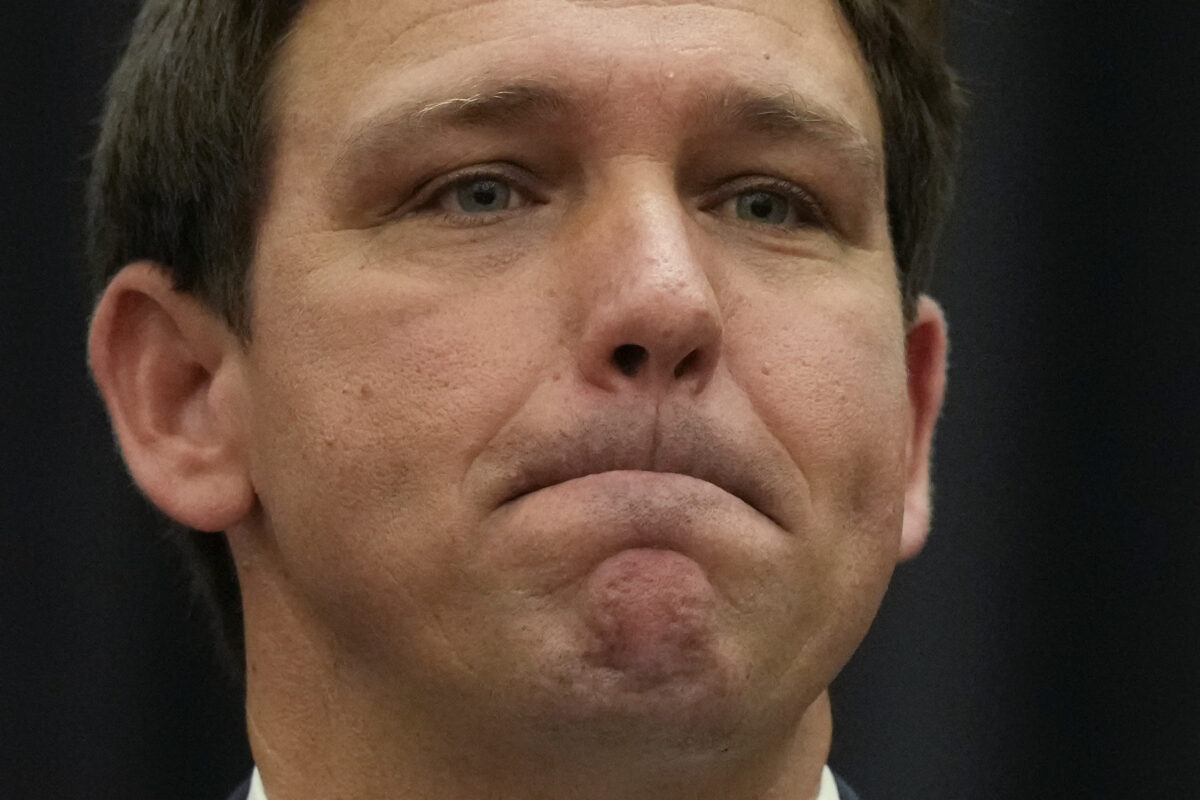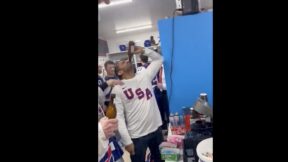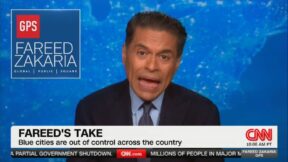Pro-DeSantis ‘Never Back Down’ Super PAC Backs Down, Quits Door Knocking in Four Key States

AP Photo/Rebecca Blackwell
“Never Back Down,” the Super PAC supporting Florida Gov. Ron DeSantis’ presidential campaign, is, in fact, backing down, quitting its door-knocking operations in four key primary states as both the campaign and PAC struggle with financial frustrations and former President Donald Trump’s dominance in the polls.
According to a report by NBC News’ Allan Smith and Natasha Korecki, PAC officials confirmed Wednesday that the group “has ceased its door-knocking operations” in Nevada and California, shortly after it also similarly quit ground game work in North Carolina and Texas. Nevada is a delegate-rich early primary state, scheduled to come third on the GOP calendar, and California, North Carolina, and Texas also comprise a treasure trove of delegates to be awarded on Super Tuesday (March 5, 2024).
The withdrawal from these key states follows DeSantis’ “rough summer,” where the governor’s “war on woke” irritated donors and failed to lure Republican primary voters away from Trump, the campaign fired a large percentage of its staff (including the campaign manager), and the candidate’s personality was brutally, frequently criticized and even mocked. Reports highlighting profligate spending — including private jet flights — and a deliberately leaked Super PAC memo attempting to advise DeSantis on debate strategy all contributed to an impression the entire operation was an extremely expensive and complicated but ultimately unwieldy boondoggle.
It’s quite the reversal from the press that the PAC labored to develop several months ago, inviting reporters to come check out the door-knocking training it was conducting in Iowa earlier this year with hundreds of canvassers who were supposed to be a part of a $100 million, multi-state effort to grind down Trump’s lead.
Instead, as the DeSantis campaign found itself shedding staff in an attempt to stop the financial bleeding, the PAC controversially took on the role of providing event planning and transportation services for the candidate himself, providing the busses and setting up rallies at the Iowa State Fair and other venues where the governor can campaign to early primary voters. Federal candidates and PACs are legally barred from coordinating and the move drew criticism from ethics watchdogs.
Besides the ethical concerns, this endeavor also absorbed a chunk of the PAC’s funds, leaving even fewer dollars to get boots on the ground to knock on doors in all those states. The PAC isn’t out of funds by any means but every bus tour and rally it funds in Iowa is dollars it doesn’t have to send door knockers around Nevada or buy television ads in a Super Tuesday state. A Tampa Bay Times report a few weeks ago had additional details about the billionaire donors who were “fueling the effort” to fund the Never Back Down PAC, and how those funds were being used to shore up where the campaign’s dwindling funds left it needing support.
And it came after months of reporting on major Republican donors refusing to back DeSantis or even publicly renouncing their support after being frustrated with the campaign’s lack of progress or the governor’s tactic of attempting to outflank Trump from the right. In early August, Robert Bigelow, the biggest individual donor to the Never Back Down PAC, told Reuters he was not donating any more money until he saw that DeSantis was able to attract new big donors and shift away from his extremist positions.
“He does need to shift to get to moderates. He’ll lose if he doesn’t,” Bigelow said. “Extremism isn’t going to get you elected.” The Reuters report identifies a six-week abortion ban DeSantis signed as a policy Bigelow singled out as too extreme. The Las Vegas-based hotel entrepreneur, who has given more than $20 million to the PAC, said he wouldn’t donate more “until I see that he’s able to generate more on his own. I’m already too big a percentage.”
The NBC News report notes that the PAC “employed more than 250 field staffers” in Nevada, California, North Carolina, and Texas at its peak earlier this year. Some of those people will be redeployed back to Iowa, New Hampshire, or South Carolina now.
Erin Perrine, a PAC spokeswoman, attempted to frame the withdrawal from those four states as a reinvestment, echoing the chatter about the campaign itself attempting to “reboot” this summer.
“We want to reinvest in the first three,” said Perrine, meaning Iowa, South Carolina, and New Hampshire. “We see real opportunities in the first three. The first three are going to set the conditions for the March states.”
The latest Real Clear Politics polling averages for those states show Trump with a 26-point advantage in Iowa, up 30.7 points in South Carolina, and 31 points in New Hampshire, where DeSantis is statistically tied with former New Jersey Gov. Chris Christie in the most recent polls, falling to third one point behind him in an Emerson survey from early August.
The PAC’s chief operating officer, Kristin Davison, insisted that the group would resume efforts in the Super Tuesday states at some future date.
“We’ll go back closer to the March primary states’ dates,” she said. “After the New Year, we’ll probably start building them out again.”
This article has been updated with additional information.
New: The Mediaite One-Sheet "Newsletter of Newsletters"
Your daily summary and analysis of what the many, many media newsletters are saying and reporting. Subscribe now!






Comments
↓ Scroll down for comments ↓